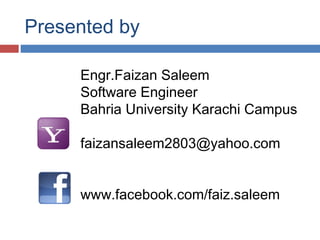Zia ul hak by faiz
- 1. ZIA UL HAQ 1977-88 Presented by : Faizan saleem
- 2. ïZia was born in Jalandhar, British India,in 1924 as the second child of Muhammad Akbar, who worked in the Army GHQ in Delhi and Selma, prior to the liberation of Pakistan from British colonial rule in 1947. ïHe completed his initial education in Selma and then attended St. Stephen's College, Delhi for his graduate degree. After graduation from St. Xavier College, Zia joined the British Indian Army in 1943. ïHe married Shafiq Jahan in 1950â51. Muhammad Zia-ul-HaqEarly life
- 3. ïĻ Shafiq Jahan Zia died on January 5, 1996.Zia is survived by his sons, Muhammad Ijaz-ul-Haq, (born 1953), who went into politics and became a cabinet minister in the government of Nawaz Sharif ïĻ Anwar-ul-Haq (born 1950) and his daughters, Zian (born 1972),[ a special needs child, and Rubina Salim, who is married to a Pakistani banker and has been living in the United States since 1980,and daughter Quratulain Zia who currently lives in London, and is married to Pakistani doctor, Adnan Majid. Family
- 4. ïZia was commissioned in the British Indian Army in a cavalry regiment on May 12, 1943 and served against Nazi Germany and its allies in World War II. ïHe was trained in the United States in 1962â1964 at the US Army Command and General Staff College Fort Leavenworth, Kansas. After that, he returned to take over as Directing Staff (DS) at Command and Staff College, Quetta. ïDuring the Indo-Pakistani War of 1965, Zia was a tank commander Army career
- 5. Backdrop ïĻ Zia took over with the declared purpose of resolving the rift between Bhuttoâs Peoples Party and the combined opposition to hold free and fare elections within 90 days. ïĻ Due to Bhuttoâs public popularity, Zia feared that he could return to power through free elections, therefore the elections were postponed. ïĻ Bhutto then charged with the murder of a political opponent was found guilty in hanged on 4th April 1979.
- 6. His performance ïĻ 1965 â He served in Burma, Malaya, and Indonesia in World War2, and in the wars with India. ïĻ 1976 - He became general and army chief of staff. ïĻ 1977 â He led a bloodless coup, imposed martial law, banned political activity, and introduced an Islamic code of law. Then he deposed President ZulfiqarAli Bhutto and he laterexecuted the formerpresident. ïĻ 1978 â He became the President of Pakistan. ïĻ 1979 â He sanctioned the hanging of formerPresident Bhutto despite international protest. ïĻ 1984 â He attempted to establish a party less politics, winning a referendum.
- 7. Industrial Policy Framework ïĻ Significant improvement in industrial policy framework during Ziaâs period: ïĪ Greater emphasis on private sector ïĪ Greater import liberalization of industrial raw materials ïĪ Strengthening of incentives manufactured exports ïĻ Yet Pakistanâs performance relative to other East Asian countries such as China Thailand, Malaysia, Korea etc was lagging.
- 8. ïĻ Death ïĻ Zia died in a plane crash on August 17, 1988. After witnessing a US M1 Abrams tank demonstration in Bahawalpur, Zia had left the small town in the Punjab province by C-130 Hercules aircraft. Shortly after a smooth takeoff, the control tower lost contact with the aircraft. Witnesses who saw the plane in the air afterward claim it was flying erratically, then nosedived and exploded on impact. In addition to Zia, 31 others died in the plane crash Muhammad Zia-ul-Haq
- 9. THANK YOU
- 10. Presented by Engr.Faizan Saleem Software Engineer Bahria University Karachi Campus faizansaleem2803@yahoo.com www.facebook.com/faiz.saleem










